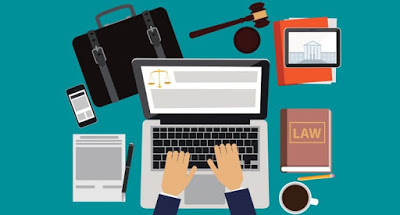
How is Technology redefining Legal Profession and Law Office Management?

Part 1
Technology has significantly impacted most
industries and fields in the world and the legal profession is not an exception
especially in the area of law office management. The legal profession like
other professional services is dynamic and it has shown this by adapting to the
socio-economic realities around the world through the integration of technology
into legal practice.
industries and fields in the world and the legal profession is not an exception
especially in the area of law office management. The legal profession like
other professional services is dynamic and it has shown this by adapting to the
socio-economic realities around the world through the integration of technology
into legal practice.
This article examined the beneficial
relationship between law and technology, its impact on law office management
and current trends in the global legal industry.
relationship between law and technology, its impact on law office management
and current trends in the global legal industry.
Many factors have influenced the economic
development of the world at different stages, the third and fourth industrial
revolution (characterized by the use of information technology to automate
production and fusion of technologies that has blurred the line between the
physical, digital and biological spheres respectively) have increased the
possibilities of billions of people being connected by mobile devices and other
means, this has engendered various inventions like internet, social media,
artificial intelligence, the internet of things, autonomous vehicles,
nanotechnology, quantum computing, etc. Similarly, new professions and skills
like Computer science, Certified Software Management, Networking, Software
Development, Systems Analysis, etc. have been birthed while old ones like Law,
Medicine, Engineering, Banking, etc. have adopted technology.
development of the world at different stages, the third and fourth industrial
revolution (characterized by the use of information technology to automate
production and fusion of technologies that has blurred the line between the
physical, digital and biological spheres respectively) have increased the
possibilities of billions of people being connected by mobile devices and other
means, this has engendered various inventions like internet, social media,
artificial intelligence, the internet of things, autonomous vehicles,
nanotechnology, quantum computing, etc. Similarly, new professions and skills
like Computer science, Certified Software Management, Networking, Software
Development, Systems Analysis, etc. have been birthed while old ones like Law,
Medicine, Engineering, Banking, etc. have adopted technology.
Legal Practice and technology
Some few years ago, lawyers were accused of
being arsy-varsy in adopting technology, critiques even suggested that lawyers
were Luddites and it was because the trade of law thrived on obsolete and
unnecessary professional practices like being ever reliant on sharp practices
and ‘medieval’ methods of document and case management, delitescent billing system
and mundane business operation. Fortunately for the profession, technology does
not discriminate, there is room for anybody, anywhere in the world to catch up
and adopt it as long as the requisite infrastructure are in place, asides this,
use of technology in the professional services industry became invaluable,
Management Consultants, Medical practitioners, Accountants, etc. rely on
technology to deliver better services to their clients and of course, reap the
benefits relatively. Therefore, as technology was customized to improve service
delivery in some of the above mentioned industry segments, developers started
designing hardware tools and software applications specifically for improving
the efficiencies within the legal practice.
being arsy-varsy in adopting technology, critiques even suggested that lawyers
were Luddites and it was because the trade of law thrived on obsolete and
unnecessary professional practices like being ever reliant on sharp practices
and ‘medieval’ methods of document and case management, delitescent billing system
and mundane business operation. Fortunately for the profession, technology does
not discriminate, there is room for anybody, anywhere in the world to catch up
and adopt it as long as the requisite infrastructure are in place, asides this,
use of technology in the professional services industry became invaluable,
Management Consultants, Medical practitioners, Accountants, etc. rely on
technology to deliver better services to their clients and of course, reap the
benefits relatively. Therefore, as technology was customized to improve service
delivery in some of the above mentioned industry segments, developers started
designing hardware tools and software applications specifically for improving
the efficiencies within the legal practice.
On one hand, technology has redefined Legal
education globally, research is the tool of legal practice, and one cannot
ignore the fact that the advent of technology has enhanced this throughout the
world, law students now have unrestricted access to contents regardless of their
physical location. Hence, many Nigerian universities (and even the Nigerian law
school) have incorporated Information and Computer Technology (ICT) into their
curriculum, similarly, lectures are now delivered using hardware tools
(computer, projectors, etc.) and software applications (Ms Office), law
faculties in the country now have libraries with Computers, internet and paid
subscription to research databases like Lexis/Nexis, Law Pavilion, etc. At the
Post-graduate level, universities around the world now offer technology related
courses for legal practitioners, for instance, Stanford Law School and Harvard
Law School offer Law, Science and Technology at the master’s level (LL.M).
education globally, research is the tool of legal practice, and one cannot
ignore the fact that the advent of technology has enhanced this throughout the
world, law students now have unrestricted access to contents regardless of their
physical location. Hence, many Nigerian universities (and even the Nigerian law
school) have incorporated Information and Computer Technology (ICT) into their
curriculum, similarly, lectures are now delivered using hardware tools
(computer, projectors, etc.) and software applications (Ms Office), law
faculties in the country now have libraries with Computers, internet and paid
subscription to research databases like Lexis/Nexis, Law Pavilion, etc. At the
Post-graduate level, universities around the world now offer technology related
courses for legal practitioners, for instance, Stanford Law School and Harvard
Law School offer Law, Science and Technology at the master’s level (LL.M).
According to a recent report by Robert Half
Legal, they made the following key findings about the impact of technology on
legal practice;
Legal, they made the following key findings about the impact of technology on
legal practice;
1. Law firms are making a greater
investment in IT
investment in IT
2. Web-based tools are improving client
communication and delivery of legal services
communication and delivery of legal services
3. Law firms’ office footprint is shrinking
4. Technology is levelling the playing
field
field
5. Corporate legal departments are using
technology tools to manage higher workloads
technology tools to manage higher workloads
6. Technology has dramatically changed the
realm of discovery
realm of discovery
Even the Nigerian justice system has given
room for technology by allowing the admissibility of “Computer Generated
Evidence” in evidence during civil proceedings and criminal trial pursuant
to Section 84, Evidence Act, 2011.
room for technology by allowing the admissibility of “Computer Generated
Evidence” in evidence during civil proceedings and criminal trial pursuant
to Section 84, Evidence Act, 2011.
Law Office Management
Simply put, law office management (also
known as law practice management) is the management of law practice. This is
the study of the organisation and methods employed in the law office and the
relationship between members of staff of that office on one hand and their
relationship with members of the public with whom they are in contact. It is
also concerned with the development of human and other resources in a law
office. Efficient office management of a lawyer comprises a number of vital
functions, including time management, organizing the paperwork and workspace,
managing cases of multiple clients simultaneously, and being in control of all
activities and responsibilities. It includes management of people (clients,
staff, and vendors), workplace facilities and equipment, internal processes and
policies, and financial matters such as collection, budgeting, financial
controls, payroll and client trust accounts.
known as law practice management) is the management of law practice. This is
the study of the organisation and methods employed in the law office and the
relationship between members of staff of that office on one hand and their
relationship with members of the public with whom they are in contact. It is
also concerned with the development of human and other resources in a law
office. Efficient office management of a lawyer comprises a number of vital
functions, including time management, organizing the paperwork and workspace,
managing cases of multiple clients simultaneously, and being in control of all
activities and responsibilities. It includes management of people (clients,
staff, and vendors), workplace facilities and equipment, internal processes and
policies, and financial matters such as collection, budgeting, financial
controls, payroll and client trust accounts.
No doubt, legal knowledge is important,
however, law office management can determine the success or failure of a legal
practitioner. Components of the law office management include; location of the
law office, size and features of the law office, employment and human
resources, equipment and furniture requirements, storage of documents, library,
office communications, power supply, rest rooms, meeting halls and visitor
rooms, working facilities, Periodicals and Journals, etc.
however, law office management can determine the success or failure of a legal
practitioner. Components of the law office management include; location of the
law office, size and features of the law office, employment and human
resources, equipment and furniture requirements, storage of documents, library,
office communications, power supply, rest rooms, meeting halls and visitor
rooms, working facilities, Periodicals and Journals, etc.
The next part of this article will bother
on importance of law office management, impact of technology on Law Office
Management and highlight the skills needed by a 21st Century lawyer.
on importance of law office management, impact of technology on Law Office
Management and highlight the skills needed by a 21st Century lawyer.
To be continued…

and
Damilola Oyebayo
